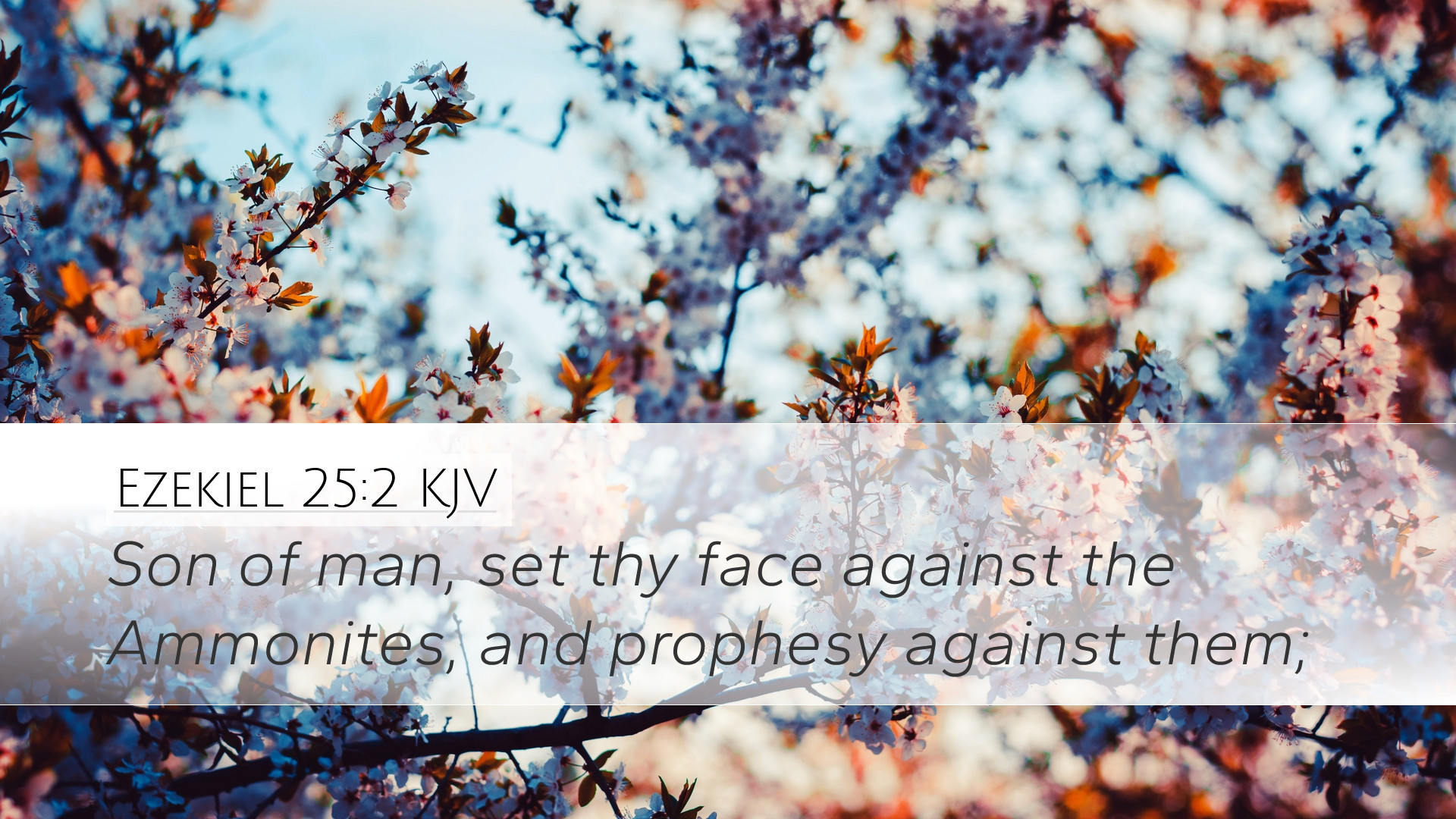Bible Commentary on Ezekiel 25:2
Verse: “Son of man, set your face against the Ammonites and prophesy against them.” (Ezekiel 25:2)
Introduction
Ezekiel 25:2 marks a pivotal moment where God instructs the prophet Ezekiel to deliver a judgment against the Ammonites. This verse is part of a broader section in which God pronounces judgments against various nation-states surrounding Israel. The passage reflects God's sovereignty over the nations and the consequences of their actions against His people.
Contextual Background
The Ammonites were descendants of Lot, and their relationship with Israel was often marked by hostility. Throughout the history of Israel, the Ammonites engaged in multiple conflicts against them. Ezekiel’s prophecy at this time reflects God's displeasure with the nations that rejoiced over Israel's calamities and acted with pride against God's chosen people.
- Geopolitical Context: The Ammonites occupied territory to the east of Israel, a region that often influenced and even competed with Israel.
- Historical Context: The tensions between Israel and Ammon trace back to the times of the Judges and were exacerbated during the reigns of kings like Saul and David.
- Theological Implication: This judgment indicates God's concern not only for Israel's welfare but also His overall justice as it pertains to all nations.
Commentary Insights
Matthew Henry's Commentary
Matthew Henry notes that this command to prophesy against the Ammonites serves a dual purpose: it reaffirms God's sovereignty and also acts as a form of comfort to the Israelites. Rather than seeing the Ammonites' temporary triumphs as a permanent status, Henry emphasizes God's ultimate plan for Israel, which includes divine retribution against its enemies. He elucidates that prophecies of this nature are significant in showing that God is concerned with justice—not only for His people but for all who oppose His will.
Albert Barnes' Notes on the Bible
Albert Barnes posits that the phrase “set your face against” indicates a serious and direct confrontation. This is not a mere warning but a declaration of impending judgment. Barnes explains that God, through Ezekiel, is articulating not only the impending doom of the Ammonites due to their iniquities but also their gloating over Israel's suffering. He points out that the Ammonites are representative of all those who oppose God and His chosen people, and their fate illustrates the certainty of divine justice.
Adam Clarke's Commentary
Adam Clarke elaborates on the nature of the prophecy and its implications. He suggests that Ezekiel’s prophecy serves as a reminder that God will not allow any nation to act with impunity, especially against those He has set apart. Clarke stresses the need for repentance, indicating that while this prophecy is a declaration of judgment, it also serves as a call for nations to recognize God’s authority and strive towards righteousness. According to Clarke, this verse encapsulates a moral lesson applicable to all nations and their leaders regardless of time and place.
Theological Themes
- God's Sovereignty: This verse affirms God's control over the affairs of nations. His commands to Ezekiel indicate that no nation, including Israel's enemies, operates outside His sovereign will.
- Moral Justice: The prophecy serves as a stark reminder of the moral order that God upholds. The Ammonites' actions have consequences, reinforcing the idea that evil will ultimately face retribution.
- Divine Retribution: The emphasis on judgment against the Ammonites reflects God's commitment to justice, providing a theological foundation for the belief that nations will be held accountable for their actions.
- Hope for the Oppressed: For the Israelites, this prophecy represents hope. It reassures them that God is attentive to injustices done to them and that He will act on their behalf.
Conclusion
In summary, Ezekiel 25:2 serves as a crucial verse that encapsulates themes of judgment, divine sovereignty, and moral order. Through analyzing various public domain commentaries, we see a multifaceted approach to understanding the implications of this prophetic declaration. For pastors, theologians, and students of the Bible, this verse invites deep contemplation on God's justice and invites reflection on how nations and individuals alike interact with that divine authority.


